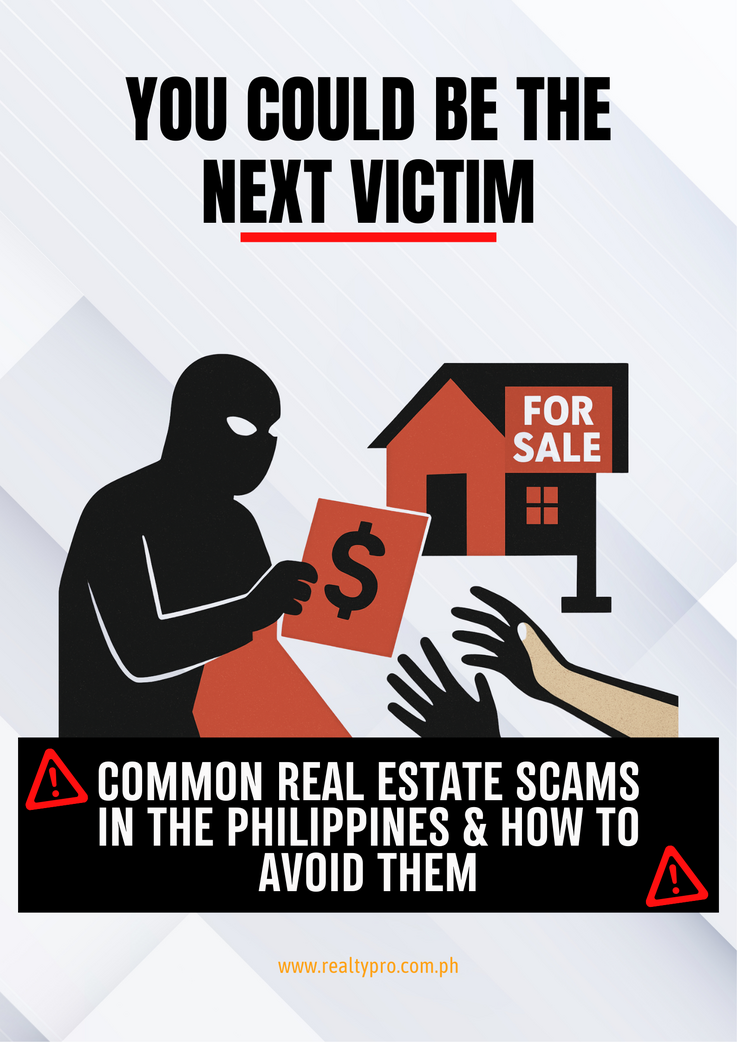Common Real Estate Scams in the Philippines & How to Avoid Them
Buying property is one of the biggest financial decisions anyone can make. Whether it’s your first condo unit, a family home, or a piece of land for future investment, the goal is always security and peace of mind. But in the Philippines, where real estate continues to thrive, scams have also become more creative and aggressive.
Understanding these schemes can help both seasoned professionals and everyday Filipinos protect their hard-earned money. Below are some of the most common real estate scams in the Philippines—and how you can avoid them.
1. Selling Without a License to Sell
Why it’s dangerous:
Without an LTS, there’s no guarantee the project is legally allowed to be sold. Many buyers end up with unfinished units or stalled projects that never get completed.
How to avoid:
Always ask for the License to Sell and verify it with DHSUD. A reputable developer or broker won’t hesitate to provide this.
2. Double Selling of Property
Why it’s dangerous:
Legal battles can drag on for years, and even if you win the case, recovering your investment can be difficult.
How to avoid:
Conduct a title verification through the Registry of Deeds. Secure a certified true copy of the title to ensure it’s clean and updated.
3. Fake Titles and Forged Documents
Why it’s dangerous:
Once you’ve paid for property with a fake title, it’s nearly impossible to recover your money.
How to avoid:
Go beyond simply checking the title. Bring the document to the Land Registration Authority (LRA) and confirm its authenticity. Hiring a trusted lawyer for due diligence is also worth the extra cost.
4. “Too Good to Be True” Deals
Why it’s dangerous:
In most cases, these properties either don’t exist, are heavily encumbered, or have pending disputes.
How to avoid:
Always research the fair market value of properties in the area. If the deal looks suspiciously cheap, take it as a red flag.
5. Unregistered or Bogus Agents
Why it’s dangerous:
Transactions made with unlicensed individuals are not legally protected, leaving you vulnerable.
How to avoid:
Always check if the person you’re dealing with is a PRC-licensed Real Estate Service Professional (RESP). You can verify this through the Professional Regulation Commission (PRC) website.
6. Rent-to-Own or Pre-Selling Traps
Why it’s dangerous:
Buyers often pay for years without seeing any progress on the supposed property.
How to avoid:
For pre-selling, again, demand the License to Sell. For rent-to-own, make sure the contract is notarized and recorded properly.
Final Thoughts
Real estate scams thrive because they prey on people’s dreams of owning a home and the lack of awareness about legal safeguards. The truth is, scams can happen to anyone—whether you’re a first-time buyer, an OFW investing for your family, or even a professional in the industry.
The best protection, therefore, is knowledge. In particular, always verify documents, deal only with licensed professionals, and, above all, don’t let emotions cloud your judgment.
Ultimately, in the end, owning property should bring you security and peace of mind, not stress. So, before you release any money, make sure everything is legitimate. Moreover, remember—“Kung mura man at mabilis, baka may kapalit.” In conclusion, protect your hard-earned investment and ensure your dream home doesn’t turn into a nightmare.
Read our latest blog about – Why a License to Sell is Non-Negotiable in Property Sales


